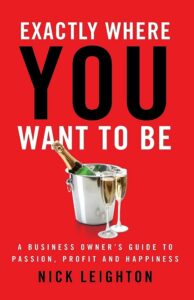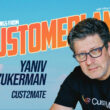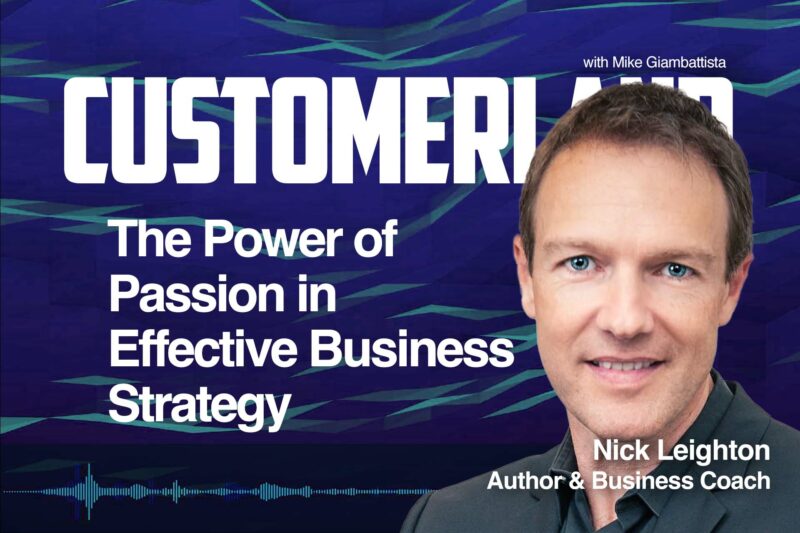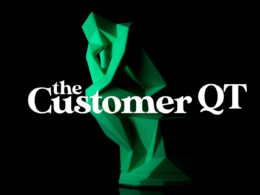Passion is a funny thing. It drives us to do the most incredible, and sometimes, the most challenging things. Join us as Nick Leighton recounts a captivating episode of his work with the United Nations World Food Program, and how he creatively pushed for an increase in donations. We venture into some thought-provoking discussions on finding not just profit, but happiness in every business journey.
As we navigate the ever-changing business landscape, we chat about the role of outsourcing and how AI is transforming processes to boost operational efficiency. We ease into discussions about fears surrounding job loss due to outsourcing, and how AI can be a game-changer for productivity. Don’t miss out on our exploration of the benefits of inter-generational communication in the workplace and how trust can be fostered through effective coaching.

Full Transcript Below
Mike Giambattista
I am honored and excited to be here with Nick Layton today. Nick is an executive coach and he’s the author of a really interesting book called Exactly when you Want to Be a Business Owner’s Guide to Passion, profit and Happiness, and he has a litany of people who are just thrilled with the book and your efforts. So, nick, thanks for joining me. Really appreciate it, really excited to see where this takes us.
Nick Leighton
Hey, mike, I’m so excited to be here. This is going to be great.
Mike Giambattista
So maybe just for context, let’s talk a little bit about your book and your perspective, why the book exists and what you do for a living.
Nick Leighton
Sure, absolutely well. I started in a client side for a large technology company and that was fascinating, as in the marketing department, did a lot of work around acquisition and getting customers on board, and that was great. And then I went agency side and I ran an agency, which originally started in Dubai in 1999, and the reason I started it was because I couldn’t find an agency to work for. So, as in, there was an agency that could represent the company I worked for. So it was by chance. I was in the right place at the right time. I spoke to five of my friends who are all marketing managers of other technology companies. I said, hey, if I start this agency in the Middle East, it understands the Middle East but it does things from a Western practice would you use the agency? And five friends said yeah. So I started the agency with five NASDAQ listed clients from day one. I was very fortunate.
And then, by chance, within the next year, Dubai announced Dubai internet city and that drove technology clients to my doorstep and I was the one shop that was specializing technology. So I was very fortunate. We got to work with very large brands. So we grew up very quickly, even though it came from the client side, I understood from an agency perspective really what it took to help large technology clients, especially when they weren’t in their home markets. So I’d say at that time 85 percent of our clients were international brand names that you’d know today who wanted to be in the Middle East region, and we kind of helped them do that.
And lead acquisition is different in every country. How we find customers, how we interact with customers, I think it’s very diverse. Even a domestic market in the US and I kind of took that feeling of how different things are in the Middle East and we can go into if we’re interested and kind of transform that into how to do things here domestically. So when I moved to, that made sense. That’s where the book came from.
And, yeah, I realized that if you want to be successful one, you’ve got to have passion for what you do. I was very lucky. I was doing what I loved, but then there were some other things, pretty basic.
Mike Giambattista
But yes, put them all in order and get it right and then we can show big results so you went from zero to a hundred in you know a very short period of time, which is unusual. I think you’d find a lot of agency owners envious of that. Yet I know that it comes with a certain amount of turmoil, headache and stress. So how would, how did you do that? How did you navigate, how did you manage that and what were some of the lessons you learned in the process?
Nick Leighton
so we were making it up as it went along being big. You know we’re talking 999 so.
I mean, they weren’t really established tools. You know, this is back when. Well, fact, when I started the agency, I think people were still sending out press releases by mail with, you know, those little film slides stuck onto them. I mean, you know, it was kind of crazy. I think our media database was, you know, a excel sheet which at one stage I think I hired two people just full-time just to keep up the date with email emails and phone numbers of media people. It was insane.
It was very much a we can do it astute. That’s really what got things going. It was that enthusiasm and it was really listening because, from an AC point of view, if you want to understand your client and I think a lot of larger sales are this way you’ve just got to listen to what they’re saying. You can’t push what you think the solution might be. So in the first few months of our agency, we thought we were going to be doing business plans and we were selling business plans, but people didn’t want to buy business plans.
They actually said no, you know, we weren’t marketing. We need, we need connections with the clients, we need credibility in this region, we need to drive sales. That’s what they told us so that’s what we started working on.
Mike Giambattista
So it was a bit of a pivot for you guys internally. I figure out how to do that as marketers. You kind of understood the objective anyways and how to get there, so it wasn’t like you just stepped into the black box and had to figure this out in the dark. Nonetheless, it was a pretty significant pivot, it sounds like.
Nick Leighton
Yeah, absolutely it was. And in fact back in those days you would go into the government to get a license to trade and I sat in this office I was probably 100 degrees and one air conditioning kind of walling away in the background and the guy said so what’s your business going to be? And I said, well, it’s going to be running business plans, it’s like sorry, that doesn’t exist.
Mike Giambattista
So you have to choose something else we don’t have that one on the list, yeah right, it’s not on the list and the book was probably written in the 1950s.
Nick Leighton
So he says but you could be management consultants. I’m like, well, what does that really mean? He’s like I’ve got no idea what it means. But it’s in the book, and underneath management consultants is marketing and sales and everything. I’m like, okay, give me the management consultant license and that kind of gives us an idea that we could do anything.
Mike Giambattista
So cut to 2017. When the book came out. All those lessons, all that learning, all of that I don’t want to put words in your mouth, but I’m sure it wasn’t just a straight shot to success. I’m sure there were some failures and some hard won lessons along the way.
What were? And again, forgive me if I’m wrong, but what was the thing that caused you to think I really need to write a book about this? Was there a moment, was it just kind of an accumulated series of events, or was there some just kind of eye-opening moment in time? You said I gotta do this.
Nick Leighton
It was a moment in time and although we represented largely technology clients, we also did pro bono work. We did work for the United Nations World Food Program, which is one of the largest charities in the world. And when they came to us they said we don’t need more customers, we need more donations. So, okay, well, we’ll start small, we’ll do like school painting competitions, get the local community going. And after a year or two of that they said well, this is great, but we need bigger. And here’s our problem. Our problem is a lot of the aid that we have to give is in this kind of Africa-Middle East going into Asia region, but most of our money comes from elsewhere. But there’s money here.
We know there’s money in the region. It may not be in everyone’s pockets, but governments, large organizations, they have the money. So how can we demonstrate that we’re a worthy place to give money? And at the time it was something ridiculous Like no, I don’t know, $3 to feed a kid for a day or something. So it’s like any money would be great money. But they wanted the big money, they wanted the million dollars donations. So I said well, why don’t we showcase what the World Program does? So our deal was we would find journalists from around the world and we would fly them to Dubai and then we’d fly them on to where the aid was given. And we would have this juxtaposition the first day would be glitzy, five-star, either in Dubai or in the city where we were, and then day two would be the poor, the aid being these kids who were malnourished and how the aid was being used. So this normally kind of played with the journal as well. So we did one of these trips and it was after a earthquake in Pakistan.
So we’re in Pakistan and on day one we met the prime minister, the president, the head of the military police and all these kinds of dignitaries in Pakistan. We then went and had dinner in the Saudi Arabia embassy and all these journalists from around the world Some of them hadn’t been to that region before they were amazed that was all this wealth.
The next day we get into helicopters and we fly up into Kashmir region to see where the aid was to run. Two United Nations helicopters and I’m looking out the window and I know we’re in the wrong place because the Kashmir mountains are on the wrong side of the helicopter and I’m responsible for these 20 journalists. Me and photographers were like, okay, fine, so I walk, I’m blocking myself. It’s one of these big helicopters. Like walk up to the front of the helicopter. I see the pilot as a big Russian dude. I’m like, are we in the wrong place or am I just wrong? And he said, nick, you see the two F-16s on the side of us, they’re telling us where to go. And I looked over and there were two F-16 fighters from the Pakistani army and F-16s are really large, really scary when they’re flying next year. So at that moment I rest.
We were being hijacked and they put us down in this schoolyard or two helicopters. That’s where it was told us where to go. And we were surrounded by guns, men’s with guns, and we were put onto a back of a truck. And at that moment I looked at our photographer, who’s news was going on, and I said to him let’s just not tell the journalists what’s going on at this stage, we’ll keep it to us. And we kind of looked at each other and we’re like, and if we get out of this we should write a book.
And that was the moment and we got taken a few miles where the Pakistani government or the military police was giving aid and the journalists were given tea and cookies and shown around a little small part of the camp, although I tried to get out of the camp and that wasn’t going to happen Not for about 20 minutes. We were allowed to go back to our helicopters and continue the journey, so we didn’t say anything to the journalists until after we’d delivered them safely home. So, by the way, that was an unscheduled stop, but that’s how other organizations, in this case the military police in Pakistan, got that publicity by hijacking our publicity. Sure, that was the moment.
Mike Giambattista
Right, so there are a bunch of lessons in there. Interesting to me that your initial response to that event was I’m going to go write a book, and that this turned out to be that one. My initial response would have been I’m getting out of this business and going to go serve french fries somewhere or something.
Nick Leighton
But you know what? It was that point when I realized, sure, if I look back, it was a huge amount of danger, anything could have happened, but I was doing what I wanted. I was living my passion. I was working with the media, which is what I wanted to do back then Involving I love aviation. I was giving aid to people who needed it. All these things came together and that’s what made it so powerful. That’s where the passion came together.
Mike Giambattista
So how does that translate into a book for business owners who are not necessarily operating in those kinds of environments, exactly where you want to be a business owner’s guide to passion, profit and happiness? There’s a journey there. I was wondering how you can, if you mind, just kind of illuminate. Okay, I’m writing a book, these are my passions. How does that translate to what is now this book?
Nick Leighton
Okay. So right at the beginning of the book we try and define what someone’s personal vision is not their business vision, but their personal vision and that leads to a passion. So if you can really take the time to sit down and go, okay, why am I working? What’s really important to me in my work life? But my personal life, my family, my friends, my hobbies, maybe it’s faith, whatever is important to you, let’s understand that, because that’s where your passion is really hidden. And then through the book, we go through the first part. We go through a journey which is kind of planning out. So you don’t go your personal vision, then you look at a business vision and then you build a plan around that. That’s the first part of the book. The second part of the book is how you do it. But it culminates in one simple thing, which is someone’s champagne moment. So everyone who I work with, I coach with right now, I know that champagne moment the one thing they’d like to do personally in the next one, two, three years.
Mike Giambattista
So some of you have some examples of what some of those champagne moments might be.
Nick Leighton
Absolutely so. For someone who’s starting out quite new that might be I want to purchase my own home. For someone who’s kind of in there maybe 40s or 50s there’s often events they want to do. They maybe want to go and live nationally for three months, or they may want to go to the Kentucky Derby They’ve never done that or they might want to go to the opening of an Olympics normally sports or event-oriented, or being in another country, I find people who are closer to retirement. They’re saying, oh, I want to start building my holiday home in a second country, maybe a country average that he came from.
So there’s a vast variety of things that you could be doing. But just having that one champagne moment, that’s something that’s personal to you, that gives you the passion to get up and do work, and so your business is kind of like the back wheels of a bicycle and as you’re in charge of that and that’s your power, is connected to the pedals and that moves you forward. But the front of the bicycle, that front wheel, that’s your personal vision is where you want to go to and the two need to be aligned and it’s like bicycling downhill with the wind behind you. You love what you do and you’re going to destination that you want to be at.
Mike Giambattista
Very interesting. I know because I interact with a lot of entrepreneurs, a lot of high-level entrepreneurs. If you ask them, in whatever phrasing you wanted to use, what is their champagne moment, what’s their personal, I think that most of those folks would be hard pressed to give you an answer, because so many of them us myself included it’s a function of just putting your head down, getting it done. Here’s my milestone check that, find the next milestone and start doing it and getting to the point where you can start identifying those really important personal goals. I think for a lot of people and I’m maybe a hair transparent here is really difficult.
Nick Leighton
Absolutely. It’s not an easy task and when I start working people they don’t have an answer. So it takes a time to go through that and that’s why we kind of introduced it at the beginning of the book. But you don’t find it until the end of the book.
Normally I like to say right at the beginning, when I work with people, goals suck, Goals could be incorrect. There’s no value in getting to the first or the next million dollars unless you have a reason behind that. And then it becomes interesting of how entrepreneurs change their business. So once you know that really often people want freedom. They don’t want to be working more than 60 hours a week. I have plenty who do. I work with plenty of people who love working eight hours. A lot of people they’re like no, I need freedom, possibly for their family or for the other things which are important to them. So how do we structure businesses which are different? And maybe the next financial goal is not really where we should be focusing. Maybe we should be focusing on trying to keep up our time more sacred. Maybe the team around you is more important, and people tell me many things which are important to them adding to the community, providing high paying jobs. All these things are really worthy and often more important than the next financial goal.
Sponsor Announcement
I want to take a quick break from the conversation to tell you about one of our sponsors. What could you achieve if you knew what your customers expected ahead of time? What if you could know what customers expect by category and by brand 12 to 18 months ahead of traditional brand tracking methods? And what if you could know exactly where to adjust and where to spend in order to derive the most benefit every time. A customer expectation audit allows you to identify areas that require strategic reinforcement, as well as pinpoint which values will contribute most to an emotional bond with your brand and optimize accordingly.
Customerland has partnered with Brand Keys, the world’s oldest loyalty focused consumer research firm, to bring real world customer expectation audits to brands, brand managers and to CX practitioners everywhere Want to know where your brand stands and exactly what to do about it.
Go to expectationaudit.com and download a sample audit today.
Mike Giambattista
Can you describe at all? Again, I don’t want to give away the book. I want my listeners to go out and buy this because it sounds fascinating and super helpful. But can you describe some of those course corrections that some of your coaching clients have undertaken, when it starts to become clear what they really want to go after?
Nick Leighton
yeah, often on this, really four things you can do in a business. You can increase your revenue by getting more customers or Maybe throw for other things you can decrease your revenue, you can increase your team or you can decrease your team. That’s where it comes down to. So lots of operation stuff outside that, but One of the easiest course correction when I start working people is they find out they’re doing something in their business they don’t enjoy doing and they don’t realize how easy is to find someone else who might love doing that part of the job and to hand it over as you start. As entrepreneurs, we do everything and we think we’re the best at doing everything, so it’s very difficult to let them let control go.
Mike Giambattista
Is that universal? I’m just not. Listeners can’t really see me not.
Nick Leighton
I have a man, entrepreneur, who is hands-off yet Because you have to learn I mean you can probably fix the printer better than anyone else can, so so we give it away. I could run to the post office quick than anyone else can. I can make way better coffee than everyone else. This isn’t the best use of my time. Right, right. Often people the admin side of things, the Accounting side of things people want to let go of that. First of all they’re like, yeah, this is really not my expertise. As businesses get larger, we realize that people can Normally be on one side of the fence either very good operationally or they’re very good on the sales and marketing side of things, particularly sales side and then there’s a choice to be made when you get to a certain size, you’ve got to bring someone else on to support you to be the other side of that fence.
Mike Giambattista
I’m interested in that, that point in time, that kind of I don’t call it a crosswords, if you will when it starts to become clear to the agency owner or the entrepreneur or whatever they’re doing, that I Guess first step is I shouldn’t be doing everything, compounded by the fact that they probably can’t do everything well. But but when it comes to a delegation of responsibilities, that can be really difficult and and I know this in all seriousness from my own personal experience and having Run an agency, having worked in other agency environments that when you’re the lead it’s all on you and there’s a certain pride of ownership there which can easily translate to kind of Control-free, maniacal, not letting go and really enjoying the fact that you don’t sleep. So so for your clients, where do those light bulbs start to go off?
Nick Leighton
Well, the sooner they go off the better. But let’s jump to today, as I recall this in August 23. We are so lucky. The technology, the advancements that has happened in the last few years Probably driven by COVID and pandemic and other things Allows us to delegate and have freedom so much easier. So If you wanted to find someone, let’s say you run agency and you do social media there is no need to have 25 to 45 dollar an hour resources here domestically doing all your work. You may well want to keep your account managers who are client facing your network, but how can we more efficiently and more effectively get the work done?
And today the workforces global. We can hire anyone, maybe project-based, maybe freelance based, maybe full-time, but they could be anywhere in the world and therefore we can use the advantages of probably being domestic and Finding people who are not that great $7, $8, $9 an hour resources exist who can do fantastic work. So how do we let go? How do we do that delegation? At the beginning I tell people to use the 80 20 principle. Now we know the age 20 principle, right, but we change around a little bit. 10% is you setting up a project? That is, the teaching someone or the briefing of a project 80% is them doing the work and 10% is you knowing you have to check it and bring it up to the right standard. Working with someone right now and he says his agency is particularly good at polishing the pole, getting the work back and spending that last 10% on it to make it fantastic.
Mike Giambattista
Interesting. Outsourcing is a thing now and I think you know, at advent of AI Six months ago, we all you know we’re completely blown away and I still am by chat, gpt and its successors. And you know, outsourcing brought certain efficiencies, but I think AI generative AI in particular is going to bring a whole new level of efficiencies that especially people who are on the production side If they’ll get past their fears of Losing my job, be coming outsourced, whatever the fear happens to be can find themselves sitting on top of a pile of work that is has never been More efficient to to execute. Yeah, absolutely, I totally agree with you as an entrepreneur or a business owner or a manager.
Nick Leighton
There’s two ways to look at this. So, first of all, you can say okay, I’m paying someone $45 an hour domestically to do something. If I get a job, I’m going to be a business owner. And the second thing if I properly utilize technology AI I could train a seven, eight, nine dollar an hour resource to do the same standard. So that’s one way to look at it. The other way to look at it and is the people who are here who are working. How are they learning AI? How are they bringing AI into their jobs? So I’m not going to say that a 45 dollar an hour resource is going to be the same productivity in the future. If they can, if they can use the resources available, if they can adapt with the AI technology, they could be way more productive and therefore there’s a very solid reason to have them on. Support your team.
Mike Giambattista
Let’s talk for a minute about the kinds of people, of businesses, that would probably find the most value working with someone like you. If you could define it, what would be the sweet spot of the type of customer that would derive the most benefit out of Nick Leighton’s services?
Nick Leighton
Well, I think it’s the same for any coach the entrepreneurs, business owners, leaders, managers who do best with coaching. First of all, they have a mindset that they don’t know everything already. That’s the first thing and that’s common that I see everywhere.
But ultimately they’re trying to achieve one of four things. They either want more profit coming in or they want more sales two different things. They have a problem with people or processes. That’s a challenge for them. They need to leapfrog to become more productive. The last one is they’re looking for more freedom. Coaches, I think, can help in each of those four areas where every new profit, people processes, freedom that’s really what people come and talk about their challenges. Then it’s that accountability that really drives you forward. So not that I’m unique. Many coaches will work this way is they’ll start with someone and they’ll meet every week or so for the first three months. That really gets the plan going, that gets them in the right direction, that gets KPIs set up, all that kind of stuff, and after that is maybe twice or three times a month where we’re holding that accountability, we’re seeing what’s next, but looking at risk, we’re looking further down the road. It takes that longevity because people are really good at coming up with excuses for not doing things.
One of the stories I tell is before COVID-19, I used to go and see people far more. I walked into one office and the owner of the business said to me I love my personal assistant. She’s fantastic, but she’s been here for a long time and every year I’ve been given a pay rise and now she’s costing more than I should pay for her. I said, well, what do you want to do about that? Then there’s multiple options. And he said well, really, I should let her go, even though I love her. She’s great, but she’s costing too much for the role. She doesn’t want to move to another role. So the decision was she’s going to leave. So I went back the next month and she was still there, and so I went and I said she’s still here, she let me in. What’s going on? And he’s like well, you know the reasons. I’m like look, just be open with me. Are you having an affair with her? Is there another reason why you haven’t let her go? He’s like no, no, no, nothing like that.
Mike Giambattista
Okay.
Nick Leighton
So I said are you going to commit next time I come in and see you? She won’t be here. And he said yeah, absolutely, the next month. I turned up yeah, she was again Now. She’s on the phone and she is arranging for her kids to go away to summer camp, which I know is pretty expensive. Like okay, that’s interesting. So I walked in I said to my client like so where are your kids going for summer camp this year? He’s like well, what do you mean? Like they’re not going to summer camp? He’s like well, you know, it’s kind of expensive and you know. You know, what I find is, like maybe they won’t go this year. Like so your kids are not going to summer camp. And her kids are going to summer camp. She was gone the next day. Okay, so that comes back to that. What’s important to me.
Mike Giambattista
Well, when you boil it down to a bottom line equation, when there’s finances involved, when you can prove out an ROI, so to speak, things become you know, there’s an amazing clarity comes in moments like that. Right, exactly.
Nick Leighton
Exactly so that kind of really vital Someone needs to find the right buttons to push for things to happen Interesting.
Mike Giambattista
So we talked a lot about the agency world, agency life entrepreneurs. Are there other sectors, industries, categories you think that would benefit from the work you do?
Nick Leighton
Actually they’re all, and I don’t just work with agencies, although I specialize there. So I work with a number of different organizations and my marketing agency also works with all kinds of not just technology companies. Well, it’s the changing landscape of who’s being employed right now and what’s there. So the generations have different amounts of people in them and we’re finding that those boomers are pretty much retiring. Gen X is coming in. There’s some interesting dynamics going on there. So I think within larger organizations you’re seeing the God being passed on. If that makes sense to some younger people and some older people may not like the way that younger people do things there needs to be some kind of translation. Even last night I had a conversation with someone.
He’s going to be in the 60s and he has about 120 people working for him, reporting directly into a very large entertainment business.
Mike Giambattista
Is that the whole company? 120 people.
Nick Leighton
No, the whole company would be much larger because they’re international, but his team is 120 people. He’s like I can’t get over how 15 minute breaks turn into 45 minute breaks. I can’t understand why, if you say this has to be done by tomorrow, it’ll be two days later. He hasn’t got that. And it used to be. You could just tell someone to do something and it would be done, and that’s clearly not the case anymore. So when we’re talking about internal operations, there’s definitely some coaching needs to go on.
There’s accountability that needs to be taught and that needs to be throughout an organization or at least through a department. So there’s some coming up understanding that needs to happen there. So there’s quite a lot of coaching that we’ll do around that how to communicate between different generations, how new managers should communicate as well. That’s not something that you’re born with, like accountability, no one teaches you accountability and, in fact, if you’re an entrepreneur, you probably have never worked for someone who’s really good at accountability. So how would you just know how to do that?
Mike Giambattista
Well worse, I resisted, and I’ve gotten good at resisting it.
Nick Leighton
Right, exactly, so holding other people accountable is just not a natural thing. So organizations are built on this shared trust. That’s what it comes down to. So there has to be this two-way trust that goes on. That’s difficult to set up, so a lot of coaching we do is in that area.
Mike Giambattista
Interesting. I’d love to have further conversations on this, to talk about it, because it has to start with an individual who’s willing to change, who’s accepting change and will actually pursue that. But ultimately, what I think you hope for is that that becomes cultural within the organization and it’s not just one person leading that charge.
Nick Leighton
Absolutely, and not only so. There’s something interesting with teams, but it’s also the exactly same in sales. Generally speaking, there are four types of people out there and you can identify what kind of person you are and what kind of person you’re talking to.
So when we’ve had conversations previously, it’s easy for us to have this communication because we have a similar communication style. But there are other people out there and you know who they are. It’s slightly harder to communicate with them and if you can identify that type of person and you can change to it, it’s easier to build a team, but it’s also much easier to sell.













